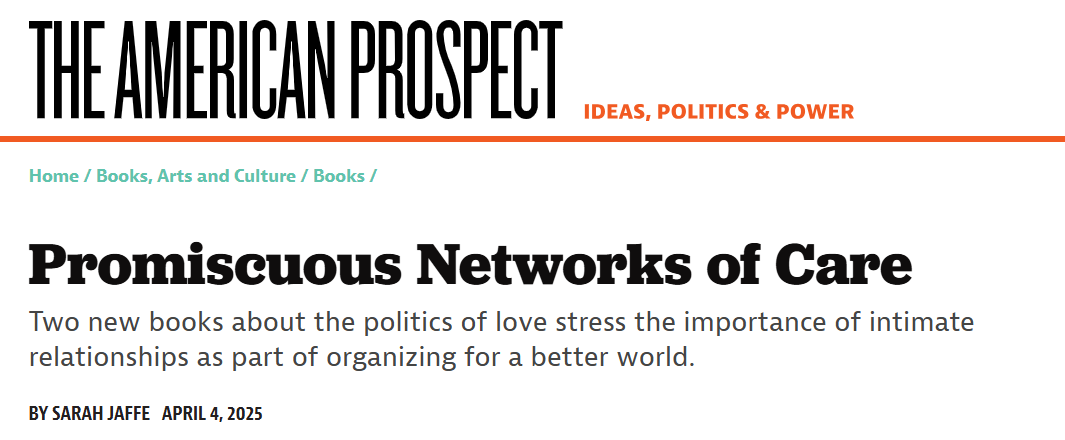Promiscuous Networks of Care
 https://prospect.org/culture/books/2025-04-04-promiscuous-networks-of-care/
https://prospect.org/culture/books/2025-04-04-promiscuous-networks-of-care/


I’ve been saying for a while that the world, particularly the West, is in a sort of romantic interregnum. The unchallenged reign of heterosexuality is crumbling—fewer
marriages, fewer
babies, fewer young people
identifying as straight—but no one form has become hegemonic in its place. The gender roles that were still dominant when I was born have been destabilized but not destroyed.
Dating sucks, the headlines proclaim, and
young people (and
the rest of us) are having less sex.
The right is trying to stop the collapse through brute force; witness Donald Trump’s day one
executive order that men are men and women should be scared, or the spread of “
Don’t say gay” bills. Restoring the (hierarchical) gendered order of things is central to the global far-right project: Jair Bolsonaro in Brazil called the
Bible “the toolbox to fix men and women,” and Korea’s now-disgraced Yoon Suk-yeol was referred to as the “
incel president.” It’s not working, though—young women continue moving left, the most recent example being the
German election, in which the gender gap was key to the rise of the far right. Korean women started the “
4B” movement, a pledge of “no marriage, no kids, no sex, no dating,” which some
American women threatened to imitate after Donald Trump’s re-election.
Sex strikes aside, though, what does all this political
Sturm und Drang do to our love lives? Two sharp, radical writers have trained their gaze on love in new books, and both insist that love is political. “This book dares us to decide that romance is not separate from our politics of liberation and resistance,” writes Dean Spade in
Love in a F*cked-Up World: How to Build Relationships, Hook Up, and Raise Hell Together, a self-help book that would make the fascists’ skin crawl. Spade, a movement lawyer, writer, and organizer, has published legal scholarship and a short book on mutual aid, but this, his first on a mainstream press, is a guide to better relationships from the standpoint of organizing. Romantic turmoil, Spade points out, can really put a damper on the trust and solidarity necessary for successful struggle: “If we want to build a world organized around care, connection, and freedom, we must combine our work ‘out there’ with rigorous work in our intimate lives.”
Shon Faye’s
Love in Exile is a memoir of sorts, a meditation on love through personal and political experience. Faye, the British author of
The Transgender Issue, turns from poignant reflection on her own loves and losses to argue that her sense of being locked out of love is, actually, symptomatic of late capitalist culture. “[T]he architecture of contemporary love, from relationships, to parenthood, to sex, to friendship, to personal well-being and even our deeper need for spiritual nourishment and wholeness, is a highly politicized terrain,” she writes. “This is why I have come to consider this profound feeling of unworthiness as a form of exile: an intentional, punitive banishment that serves political ends.”
snip






